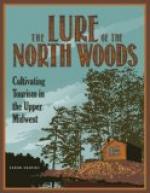Then Scott said to Driscoll, “You had better take your friends to the bunk-house and tell the cook to make you supper. You know where to get blankets.”
Stormont got up with an effort, and when he went out with the others Scott smiled.
“I’m not going back on my duty, but I don’t want that outfit in my shack,” he said.
Next morning after breakfast Stormont came in. He had to some extent recovered from his fatigue, but looked worn and dispirited.
“I guess I owe you some thanks,” he said.
“I don’t know if you do or not,” Scott answered coolly. “In the bush, a starving man is, so to speak, entitled to ask for food and shelter. I couldn’t refuse.”
Stormont gave him a keen glance. “Well, there’s another thing. It’s a long trail to the railroad and I want to buy stores enough to see us out.”
“Then I suppose I must let you have supplies; but you can’t expect to get them as cheap as at the settlements. In fact, you’ll have to pay my price.”
“That needn’t break the deal,” Stormont replied. “I know when there’s no use in kicking.”
“An unsuccessful prospecting trip is an expensive undertaking,” Scott said meaningly. “Then there’s the disappointment. You would have got a big lift if you’d been lucky enough to find Miss Strange’s silver.”
“The silver is not Miss Strange’s. The law gives a mineral vein to the person who stakes it off and records it first.”
“That is so,” Scott agreed. “Well, you don’t look as if you had staked a valuable claim! I suppose you stopped too long trying to find the vein, and the ice was unsafe when you left. However, you want supplies to carry you down to the settlement, and if you’ll come along to the store, we’ll see what I’ve got.”
They went out, and in the afternoon Stormont’s party took the trail to the South.
CHAPTER XIV
STORMONT DISOWNS A DEBT
The general store was empty, and Drummond, leaning on the counter, frowned as he glanced at the clock. It was a few minutes after the time for closing and he had been busily occupied all day. Besides, he had an engagement at the pool-room and thought he would be late. If so, a man whom he knew he could beat would probably begin a game with somebody else, and he would miss an opportunity of winning two or three dollars. This was annoying, because Drummond needed the money, but he had other grounds for feeling dissatisfied.
Keeping store was monotonous and rather humiliating work that left one very little time for amusement. He could drive a fast horse as well as other young men he met up town, play a clever card game, and beat his friends at pool. His talents were obviously wasted in measuring dry-goods and weighing flour. Moreover, since meeting Stormont he had been extravagant and got into debt. There was no need to be economical when he had been promised a share in a rich mining claim.




